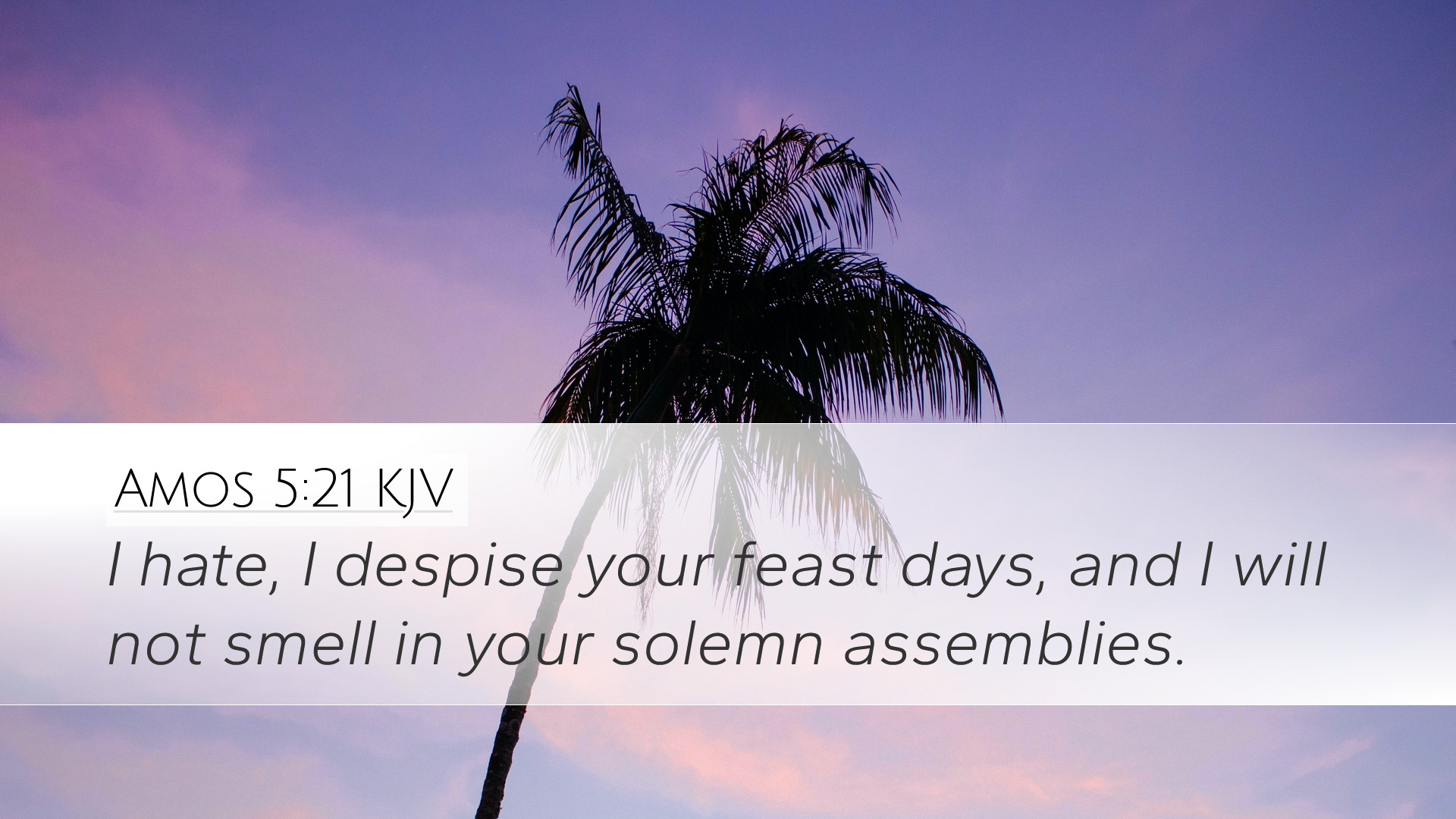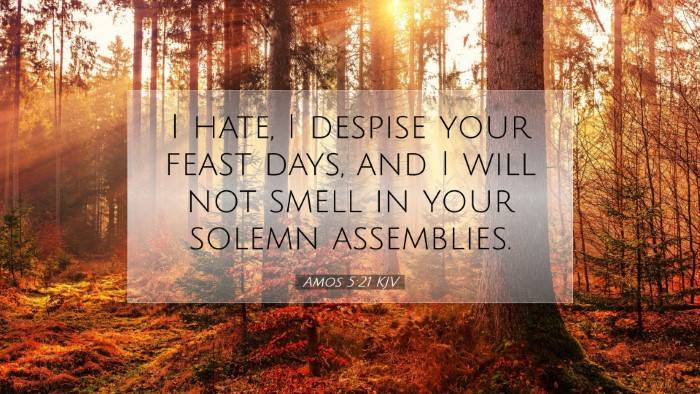Old Testament
Genesis Exodus Leviticus Numbers Deuteronomy Joshua Judges Ruth 1 Samuel 2 Samuel 1 Kings 2 Kings 1 Chronicles 2 Chronicles Ezra Nehemiah Esther Job Psalms Proverbs Ecclesiastes Song of Solomon Isaiah Jeremiah Lamentations Ezekiel Daniel Hosea Joel Amos Obadiah Jonah Micah Nahum Habakkuk Zephaniah Haggai Zechariah MalachiAmos 5:21
Amos 5:21 KJV
I hate, I despise your feast days, and I will not smell in your solemn assemblies.
Amos 5:21 Bible Commentary
Commentary on Amos 5:21
Amos 5:21 states:
"I hate, I despise your feast days, and I take no delight in your solemn assemblies."
Introduction
This verse emerges from the prophetic words of Amos, addressing the people of Israel during a time of spiritual decline. The weight of God's displeasure is heard in these words, echoing through the ages as a vital lesson for worshipers on the essence of true devotion.
Contextual Overview
The book of Amos is a significant text within the Minor Prophets, reflecting a period when Israel was enjoying prosperity, yet was morally and spiritually corrupt. The nation was engaged in ritualistic worship, but God, through Amos, challenges the sincerity of their heart towards their practices. Understanding this context is crucial for grasping the profound message within Amos 5:21.
Insight from Matthew Henry
Matthew Henry emphasizes the starkness of God’s utterance, where He expresses His contempt for the feasts and solemn assemblies of Israel. According to Henry, God's rejection is directed not simply against the rituals themselves, but against the hypocrisy that undergirds them. He elaborates:
- The Nature of Worship: Henry points out that worship devoid of righteousness and true piety is found detestable in God’s sight. The people engaged in festivals without genuine repentance or adherence to God's moral law.
- God's Indignation: God does not merely find these practices displeasurable; rather, He actively hates them. This strong language serves to illustrate the gravity of complacency and insincerity in worship.
- Call to Authenticity: Henry encourages believers to reflect upon their own practices and motivations. Are our gatherings and religious acts marked by authenticity and a heart aligned with God’s will?
Insight from Albert Barnes
Albert Barnes, in his commentary, offers a perspective focused on the social and moral failures of Israel. He notes:
- Feasts and Assemblies: Barnes identifies the feasts mentioned as a time of celebration that had become mere formalities. Instead of genuine worship, they served as a cover for injustice and immorality rampant within the society.
- God’s Displeasure with Ritualism: These words denote how God desires more than external conformity to religious duties; He seeks to establish a relationship rooted in justice and mercy.
- Challenge to Spiritual Leaders: Barnes warns spiritual leaders to be cautious. If the essence of faith is replaced with empty practices, it can lead to divine abandonment.
Insight from Adam Clarke
Adam Clarke offers additional exegetical depth to the passage, underscoring the unique elements of the Hebrew text:
- Desire for Sincerity: Clarke elaborates on God’s distaste for outward rituals that lack the corresponding inward sincerity. He posits that God desires a return to true repentance over mere observances.
- Historical Context: Clarke contextualizes the experience of Israel, detailing how the nation’s festivals had historically served as occasions for communal unity, yet had devolved into mere forms lacking genuine commitment.
- Exhortation to Reform: Clarke asserts that the passage serves as a clarion call for reformation among God’s people, reinstating the need for integrity in spiritual life.
Theological Implications
The implications of Amos 5:21 are deeply theological, challenging congregations to introspectively assess the culture of worship present in their communities:
- The Heart of Worship: True worship is not just defined by external acts but by the condition of the heart and life of the worshiper.
- The Nature of God: Understanding God's distaste for insincerity cultivates a fear and reverence for His holiness. Believers are called to consider what pleases God rather than merely adhering to tradition.
- Call to Ethical Living: The passage indicates a symbiotic relationship between worship and ethics. Genuine worship must inspire a commitment to social justice and righteousness.
Practical Application
For pastors, students, and theologians, Amos 5:21 challenges the church today with several practical applications:
- Examination of Practice: Regularly evaluate congregational practices: Are they genuinely honoring God or simply tradition?
- Encouraging Genuine Worship: Foster environments where authentic worship and personal transformation are prioritized over mere attendance or performance.
- Integration of Ethics in Faith: Encourage members to understand that participation in worship is inseparable from living out God's commands in daily life.
Conclusion
Amos 5:21 serves as a poignant reminder of God's disdain for empty ritualism. Within this condemnation lies a profound invitation: to return to a heartfelt, authentic worship marked by justice, mercy, and personal integrity. In contemplating this verse, let us aspire to form faith practices that delight God and align with His desires for righteousness.


